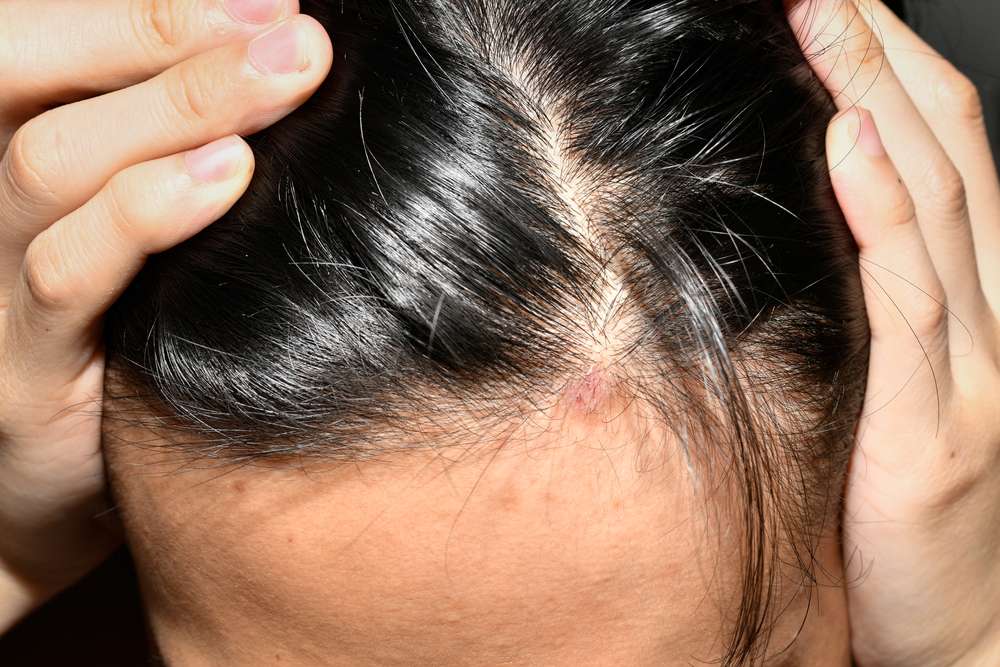Scalp Psoriasis: Early Signs, Triggers, and What to Watch For
Scalp psoriasis often begins subtly — with mild flaking, irritation, or redness that’s easy to dismiss as simple dandruff. But early signs like these can be the first indicators of a chronic skin condition. In this guide, we’ll explore the most common triggers of scalp psoriasis, what the early signs actually look like, and what actions can help manage symptoms early — especially for seniors or those already living with psoriasis elsewhere on the body

What does scalp psoriasis look like in its early stages?
In its initial phases, scalp psoriasis can be challenging to distinguish from other common scalp conditions. Early signs often include:
-
Fine, silvery-white scales on the scalp
-
Mild redness or pink patches on the skin beneath the hair
-
Slight itching or burning sensation
-
Small areas of dry, flaky skin that may extend slightly beyond the hairline
These symptoms may be localized to a small area or spread across larger portions of the scalp. It’s important to note that early-stage scalp psoriasis can be mistaken for dandruff, seborrheic dermatitis, or even fungal infections, making proper diagnosis crucial.
What are the common triggers of scalp psoriasis flare-ups?
Understanding the triggers of scalp psoriasis can help in managing the condition effectively. Common triggers include:
-
Stress: High levels of stress can exacerbate psoriasis symptoms
-
Cold, dry weather: Winter months often lead to increased flare-ups
-
Skin injuries: Cuts, scrapes, or sunburns can trigger new psoriasis patches
-
Certain medications: Beta-blockers, lithium, and antimalarial drugs may worsen symptoms
-
Infections: Strep throat and other infections can trigger psoriasis in some individuals
-
Alcohol consumption: Excessive drinking may increase the frequency of flare-ups
-
Smoking: Tobacco use can worsen psoriasis symptoms and make treatments less effective
Identifying personal triggers can be a crucial step in managing scalp psoriasis and reducing the frequency of flare-ups.
How can you recognize scalp psoriasis vs. dandruff?
While both conditions can cause flaking and itching of the scalp, there are key differences:
Scalp Psoriasis:
-
Presents as thick, silvery-white scales
-
Often has clearly defined, raised, red patches
-
Can extend beyond the hairline onto the forehead, neck, or ears
-
May cause hair loss in severe cases
-
Can be accompanied by psoriasis on other parts of the body
Dandruff:
-
Produces smaller, looser, yellowish or white flakes
-
Generally affects the entire scalp more uniformly
-
Rarely extends beyond the hairline
-
Does not typically cause hair loss
-
Is not associated with inflammation or redness of the skin
If you’re unsure which condition you’re dealing with, consulting a dermatologist for a proper diagnosis is advisable.
What are the best treatment approaches for seniors with head psoriasis?
Seniors with scalp psoriasis may require special considerations due to potential medication interactions and skin sensitivity. Effective treatments include:
-
Medicated shampoos: Containing salicylic acid or coal tar to help remove scales
-
Topical corticosteroids: To reduce inflammation and itching
-
Vitamin D analogues: Such as calcipotriene to slow skin cell growth
-
Light therapy: Controlled exposure to UVB light can improve symptoms
-
Systemic medications: For severe cases, oral or injectable drugs may be prescribed
It’s crucial for seniors to work closely with their healthcare providers to find a treatment plan that balances efficacy with potential side effects and existing health conditions.
How do treatment costs compare for different scalp psoriasis options?
Treatment costs for scalp psoriasis can vary widely depending on the severity of the condition and the chosen treatment approach. Here’s a comparison of some common treatments:
| Treatment | Provider Type | Estimated Cost Range (GBP) |
|---|---|---|
| Medicated Shampoos | Over-the-counter | £5 - £20 per bottle |
| Topical Corticosteroids | Prescription | £10 - £30 per tube |
| Vitamin D Analogues | Prescription | £20 - £50 per tube |
| Light Therapy | Dermatologist | £40 - £100 per session |
| Systemic Medications | Prescription | £100 - £1000+ per month |
Prices, rates, or cost estimates mentioned in this article are based on the latest available information but may change over time. Independent research is advised before making financial decisions.
It’s important to note that while over-the-counter options may seem more affordable initially, prescription treatments, though potentially more expensive, might provide more effective long-term management of symptoms. Additionally, some treatments may be partially or fully covered by the NHS, potentially reducing out-of-pocket expenses for patients.
When should you seek professional help for scalp psoriasis?
If you notice persistent scalp issues that don’t respond to over-the-counter treatments, it’s time to consult a healthcare professional. Seek medical advice if:
-
Symptoms persist for more than a few weeks
-
The condition significantly impacts your quality of life
-
You experience severe itching or pain
-
You notice hair loss or visible patches beyond your scalp
-
Over-the-counter treatments aren’t providing relief
Early intervention can lead to better management of scalp psoriasis and prevent potential complications. A dermatologist can provide a definitive diagnosis and develop a tailored treatment plan to address your specific symptoms and needs.
In conclusion, recognizing the early signs of scalp psoriasis and understanding its triggers are crucial steps in managing this chronic condition. While it can be challenging to distinguish from other scalp issues initially, paying attention to the specific characteristics of the scales and affected areas can help in early identification. With a range of treatment options available, from over-the-counter solutions to prescription medications, most individuals can find an effective management strategy. Remember, professional medical advice is invaluable in navigating the complexities of scalp psoriasis, especially for seniors or those with pre-existing health conditions.
This article is for informational purposes only and should not be considered medical advice. Please consult a qualified healthcare professional for personalized guidance and treatment.




